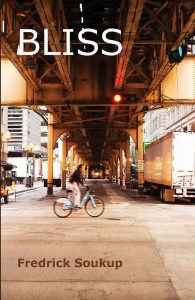
Writing Bliss presented several challenges which I would divide into two categories: the literary and the personal.
Portraying the impediments to Danielle and Connor’s relationship—the central plot of Bliss—was challenging primarily because those impediments are societal, as opposed to interpersonal or circumstantial. It would be one thing if they were merely too stubborn or prideful to admit their feelings, if they only misunderstood each other (which, for much of the novel, they do), or if they were from rival families, he a Montague, she a Capulet. But it is their socioeconomic and racial differences that threaten the love between them, and capturing the implications of these differences was thorny. Societal constructs are both omnipresent, all-powerful and insidious, and rarely discussed in everyday life, much less between two individuals from completely different backgrounds, like Danielle and Connor.

Connor, raised amid affluence and ease in a predominantly white community, has never reflected much on the luxuries of his race, which are apparent to Danielle, raised amid poverty and strife in a predominantly black community. More, she cannot comprehend why someone would forgo the opportunities wealth has offered him, as Connor attempts to do in the beginning of the novel. A rec center employee devoted to the needs of underserved children, she knows that luxury and opportunity are rare and precious blessings, and falling in love with someone who doesn’t understand this feels to her like a betrayal of her community. They are each caught between two worlds—their own and their lover’s—worlds their love can reveal but perhaps never reconcile. Perhaps.
Bliss also presented a personal challenge, because years of examining these characters’ worldviews had a powerful, if disquieting, effect on my own. I am the child of middle class parents who fostered roughly seventy kids. I attended public high school in northern Minnesota, then private college at St. John’s University (MN). I grew up believing I was capable of grasping a wide array of viewpoints. So, when I conceived of the basic premise behind Bliss back in 2014, at the tail end of a brief correctional career in Saint Paul, Minnesota, I felt that my experience—in particular, the year and a half I spent as a guard at the Ramsey County Juvenile Detention Center—offered me unique insights into urban poverty and relations between law enforcement and communities of color. However, the more I explored Danielle and Connor’s lives and the more confident I was in their motives and natures, the more I asked the obvious question: What right do I, a white man in 2020 America, have to write a love story featuring a black woman?
To this I have no answer. I can only take solace in the equally obvious fact that I am no authority, not on America, its merits or ills, not on race, womanhood, or love; rather, my time with Bliss has further convinced me that the realm of fiction is not for authorities. It is for the uncertain, those with more questions than answers, those who wish to understand the things they know they never will.

Fredrick Soukup received a philosophy degree from St. John’s University (Minnesota) in 2010. Excerpts from his works have been published in Fluent Magazine and Sou’wester. His debut novel, Bliss, will be released March 2, 2020 by Regal House Publishing. He lives in Saint Paul with his brilliant wife, Ashley.


